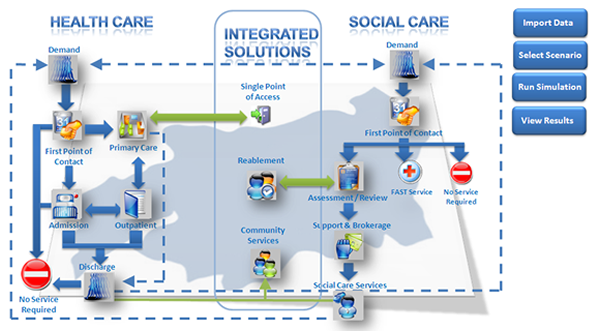Written by Raquel on Friday December 9th 2011 in Press Releases
SIMUL8 helps plan integrated care in the UK
In a recent report by Richard Humphries for The King’s Fund– a charity that seeks to understand how the health system in England can be improved- it was highlighted that “well coordinated health and social care can produce better outcomes, improve experience of using services, and make limited services go further”. With that said, that’s why our cutting edge work in health and human service integration with the NHS Gloucestershire and Gloucestershire County Council in the UK has been so exciting.
What was even more exciting was the response from the Joint Executives! We’ll get to that later though, first let’s see how everything came together.
 Gloucestershire NHS built their own simulation to understand how patients and service users flow between health and human services, and to test the potential impacts of integrated solutions, such as increased reablement and a single point of access.
Gloucestershire NHS built their own simulation to understand how patients and service users flow between health and human services, and to test the potential impacts of integrated solutions, such as increased reablement and a single point of access.
Using Scenario Generator, a simulation tool designed by the NHS Institute for Innovation and Improvement with SIMUL8 Corporation-which includes both health and human service pathways-Gloucestershire built a simulation, driven by their population and disease and human service prevalence.
The simulation was validated by data from the NHS and the County Council, and run to see the impact on costs if health and human service continued to deliver services as they are today in 5 years time. These results were compared with what would happen if reablement were increased or a single point of access implemented.
Gloucestershire also built a visual display to help explain to the two organisations and their stakeholders, how the system worked and what the changes would mean.

The feedback from the Joint Executives who viewed the results was that:
“This is the most exciting project we have seen to help with our strategic planning”.
The team working on this project agreed that they had learned a huge amount about how the two systems interacted, and are now working on a series of change scenarios to test their implications prior to implementation.
As a result of the Gloucestershire project, SIMUL8 Corporation have seen an increase in interest from local government in using simulation to test the implications of change programmes, and several health and human service teams working together on projects using Scenario Generator. This comes at at time when the necessity of integrated care is at its peak; “Innovation such as integrated care is necessary, particularly in this time of economic austerity, as nations and localities search for effective responses to the needs and demands of an ageing population.”